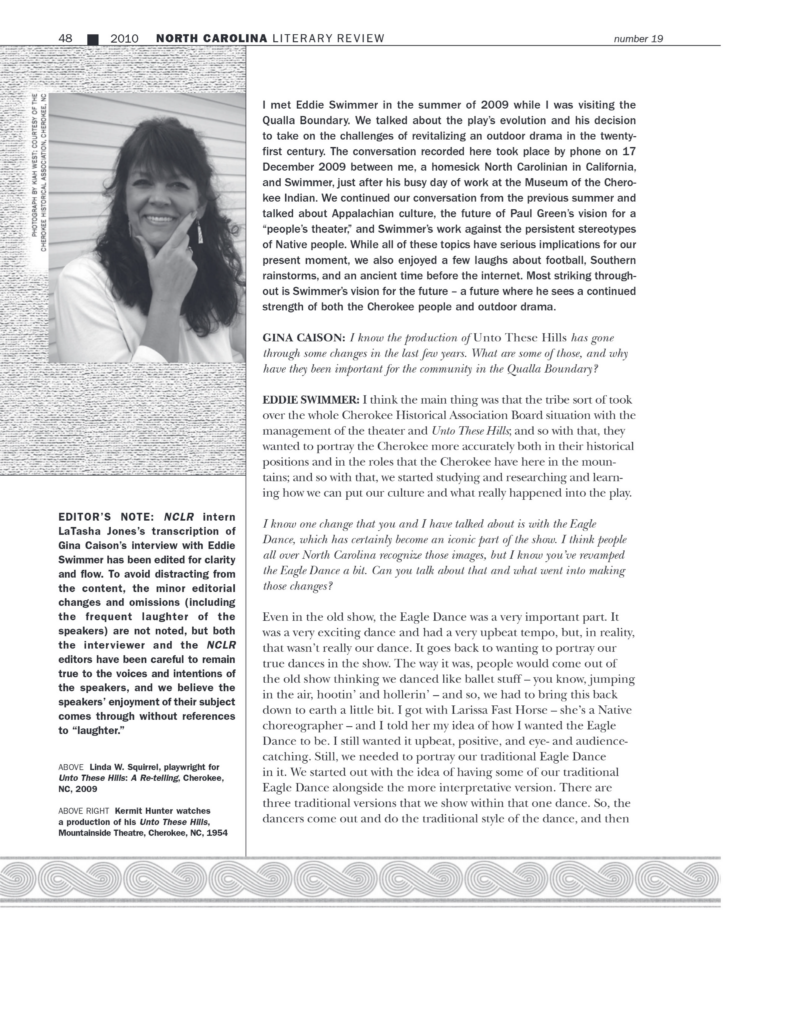Friday from the Archives: “We’re still here”: Eddie Swimmer on Cherokee History, Life, and Outdoor Drama in the Appalachian Mountains“, an interview by Gina Caison from NCLR Issue 19 (2010)
We’re excited to see so many writers, artists, and readers getting their copies of NCLR 32 featuring “Native American Literature of North Carolina.” Between our two online issues in 2023 and the print issue, we are proud to finally highlight an important voice in our state’s rich literary culture.
The Lost Colony is garnering national attention for the important work updating the script and hiring Native Americans for roles in the show. In 2010, writer Gina Caison interviewed Eddie Swimmer, who did this work for one of NC’s other long-running outdoor dramas, Unto These Hills. Swimmer was honored in 2018 with the Hardee Rives Award for Drama, partly for his work on the show.
Here are a few excerpts from their exchange:
GINA CAISON: I know the production of Unto These Hills has gone through some changes in the last few years. What are some of those, and why have they been important for the community in the Qualla Boundary?
EDDIE SWIMMER: I think the main thing was that the tribe sort of took over the whole Cherokee Historical Association Board situation with the management of the theater and Unto These Hills; and so with that, they wanted to portray the Cherokee more accurately both in their historical positions and in the roles that the Cherokee have here in the mountains; and so with that, we started studying and researching and learning how we can put our culture and what really happened into the play.
CAISON: If you look in the program, there are tons of community members cast in the show. And I think you mentioned in the past, even family members of the historical figures play some of the main parts. Do you think this provides an extra layer to the performance – having so many community members?
SWIMMER: I think that’s one draw. When people visit the Cherokee in the Qualla Boundary here, they’re seeing ancestors of people who hid out in the mountains, who resisted the Removal – then also, some who are family members of those who have been on the Trail. They’re portraying their ancestors, their relatives, and I think that’s what makes this outdoor drama different from some of the other outdoor dramas.
CAISON: Do you have any thoughts on where the play fits in with the growing interest and body of Native
American literature in the country?
SWIMMER: I guess for so long we’ve been sort of put on the back burners and if you look at the movies, when the Native American role came up, it was played by maybe a Filipino or another person painted in brown paint. It really wasn’t a Native person. The whole thing here is just trying to prove that we still can do it. We’ve got a lot of stories we can tell, and our history is exciting and full of adventure and love interests – and tragedy, the sad parts. All that makes a good play is comedy and tragedy, and we try to use all of that together in the show. As American literature, our stories have really not been written, but they are being written down now – the history, the myths, and legends.”
CAISON: Green had expressed some concern about the future of outdoor drama – and even you mentioned that attendance had started to decline at Unto These Hills. Like you said, people have other pastimes. What do you think about the future for outdoor drama?
SWIMMER: Well, I think the outdoor drama is going to stick around. We have enticed the audience. Again, we can’t rely on old shows that have been running for fifty years because, going back to audience, they are knowledgeable. They are a smart audience, and they want to be entertained at the same time. At the outdoor drama, I think the script writing is going to have to be up to par and even better. The actors have to be more believable. The whole show, everything, has to be more entertaining because you’ve got these little kids who are playing video games, Wii games, and that stuff is realistic. If they go see a play and people are acting like robots on stage, that’s going to be boring to a kid. It would be boring to me also. We have to keep them entertained and educated. We have to really be on our toes when people come in to see the play. I think outdoor drama has a future and to me, I would like to see, probably along with all my other colleagues who work in outdoor theater, that this could be a training ground for actors. I really want this to be a stepping stone for my actors. They can use this as training base to get what they need to be an actor, singer, dancer, whatever, and then move on to bigger and brighter things. That’s the goal I have here.
Read the whole article via Proquest or order the 2010 issue for your collection.
